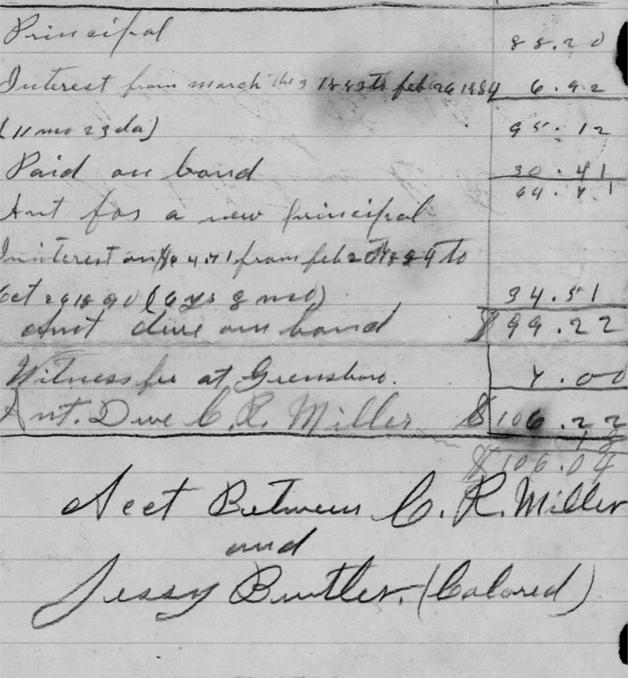Accounting of debts for Mr. Jessa Butler
This is a portion of a document that was used to track the amount of money owed by Jessy (also spelled Jessa) Butler to Charles R. Miller. Jessy Butler was a tenant farmer on the land of Miller. Along with this accounting of debt is a chattel mortgage, where Butler promises to Miller that he will pay off his debt, and if he does not, then Miller may sell his horse to pay the debt.
The system of sharecropping ensured that the sharecropper -- in this case, Jessy Butler -- remained poor and in debt to the owner of the land, and therefore would never be able to farm indepedently and earn a profit for themselves.
These documents are from the W. R. Miller Papers, North Carolina State Archives.

[Documents of contracts between Charles R. Miller and Jessy Butler.] W. R. Miller Papers, PC.1437, State Archives of North Carolina, Raleigh, NC.
Finding aid: https://axaem.archives.ncdcr.gov/findingaids/PC_1437_W__R__Miller_Papers.html
| Principal | 88.20 |
| Interest from march the 3 1883 to feb. 26 1884 | 6.92 |
| (11 mos 23 da) | 95.12 |
| Paid on bond | 30.41 |
| Amt for new principal | 64.71 |
| Interest on $64.71 from feb. 26 1884 to Oct. 26 1890 (6 yrs 8 mo) | 34.51 |
| Amt due on bond. | $99.22 |
| Witness fee at Greensboro | 7.00 |
| Amt. Due C. R. Miller | $106.22 |
| [Surplus money credited to Mr. Butler after he paid back a different debt] | 0.18 |
| $106.04 |
Acct Between C. R. Miller
and
Jessy Butler. (Colored)
Public Domain
Public Domain is a copyright term that is often used when talking about copyright for creative works. Under U.S. copyright law, individual items that are in the public domain are items that are no longer protected by copyright law. This means that you do not need to request permission to re-use, re-publish or even change a copy of the item. Items enter the public domain under U.S. copyright law for a number of reasons: the original copyright may have expired; the item was created by the U.S. Federal Government or other governmental entity that views the things it creates as in the public domain; the work was never protected by copyright for some other reason related to how it was produced (for example, it was a speech that wasn't written down or recorded); or the work doesn't have enough originality to make it eligible for copyright protection.